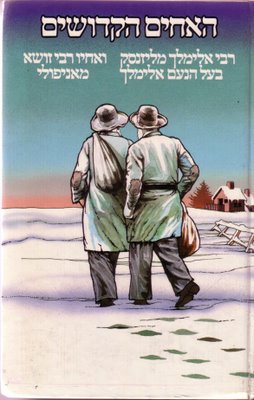Monday, January 30, 2006

Tonight and tomorrow, the 2nd of Shvat, is the yahrzeit of the Rebbe Reb Zusia of Anipoli, talmid of the Maggid of Mezritch and the younger brother of the Rebbe Reb Elimelech of Lizhensk, who introduced him to Chassidus. He was a great anav [humble person] and had fervent yiras Shamayim – fear of Heaven. His divrei Torah appear in a small sefer called Menoras Zahav [“The Golden Candelabra”]. Reb Zusia is also the forefather of the Hornsteipel Twerski family, who are direct descendants [ben acher ben] of his.
The Rebbe Reb Zusia was always involved in dveykus [clinging to Hashem], in tikkun [rectification] and teshuva [penitence]. He and his older brother, the Rebbe Reb Elimelech, spent several years incognito in a self-imposed exile, to atone for the "sins" of their youth and to improve themselves spiritually.
His intense Ahavas Yisrael – love for his fellow Jew – meant that he would never embarrass others. When he saw someone who needed a tikkun, for example, for lashon hara [improper speech such as gossip], he would say: “Oy, has Zusia sinned today! He said so much lashon hara!” He said this so fervently that those around him who were guilty of lashon hara immediately felt their lack, and did teshuva for it.
Reb Zusia had a notebook in which he would record all of his misdeeds and improper thoughts of the day. Each evening before retiring, he would read through the day’s mishaps, and would cry so profusely that the entire writing would be erased from the tears that fell.
He often would commune with nature, which he preferred to sitting and learning in the beis medrash [study hall]. There he would sing the verses of King David’s Tehillim [Psalms] with a sweet voice and wondrous dveykus, which attracted whomever heard him. Their hard, cold hearts would be softened and responsive to the sweet sounds of the chapters of Tehillim which he sang. His song aroused those who heard it to teshuva…in fact, that was the goal of his song.
The niggunim of others also drew his heart – as long as it was directed Heavenwards. His intense Ahavas Yisrael was also shown towards those who sinned, as evidenced in the following.
One Yom Kippur night, the Jews in the Shul in Anipoli stood covered in their talleisim [prayer shawls]. At the prayer stand was the chazan [cantor], whose voice trembled with the words: “V’nislach l’chol Adas Bnei Yisrael, vla’ger hagar bsocham, ki l’chol ha’am b’shgaga – the entire community of Israel, along with the proselytes who join them shall be forgiven, since all the people acted without knowledge” [Bamidbar 15:26]. The chazan sang these words with a tune that moved the trembling hearts of the congregation towards their Father in Heaven, and filled them with longing and yearning for Hashem.
Then they heard the Rebbe Reb Zusia’s voice sing out to Hashem: “Ribono shel Olam [Master of the World], if the Jews had not sinned, they could never sing such a lofty niggun as this, as they cry out for help. Ribono shel Olam, hear this beautiful niggun, which is full of outpouring of the soul and yearning for You, and forgive the entire community of Israel, who are singing such a lofty tune before You, begging for Your forgiveness.”
Just as teshuva can transform evil into goodness, a niggun can be lifted up from the dirt to become a source of Kedusha [holiness]. Once the Rebbe Reb Zusia passed through a field, where he heard a shepherd, who was tending his flock, play a lovely niggun on his flute. Reb Zusia approached him and listened intently, until he memorized the tune. He then continued joyfully on his way, feeling that he had redeemed a niggun of the Shepherd King David from its long exile.
Zechuso yagein aleinu v’al Kol Yisrael, may the Rebbe Reb Zusia’s merit protect us all!
